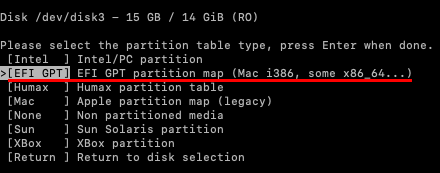

Delete all data in the partition tableĪfter selecting a recovery option we now select a partition from the disk which we previously selected. Analyse current partition structure and search for lost partitions Lets choose Advanced and see how it plays out,ĭisk /dev/sda - 500 GB / 465 GiB - ST500VT000-1DK142.We select the most appropriate choice then proceedĪt this point we can either choose Advanced or Analyze recovery options.

Hint: Intel partition table type has been detected. EFI GPT partition map (Mac i386, some x86_64.) Please select the partition table type, press Enter when done. Next we choose a partition table type, by default the system will identify the correct partition table type. Select a media (use Arrow keys, then press Enter): Next we enter a password after being prompted since this requires administrative privileges.Īfter entering the password we are redirected to another screen where we select a disk we want to recover data from. So we create a new log file by selecting create option.

In this article we discuss how to recover such files. Testdisk is a powerful data recovery tool, its primary function is to recover lost partitions or rebuild boot sectors using data backups, these functionalities can also be used to recover lost files in Linux.


 0 kommentar(er)
0 kommentar(er)
